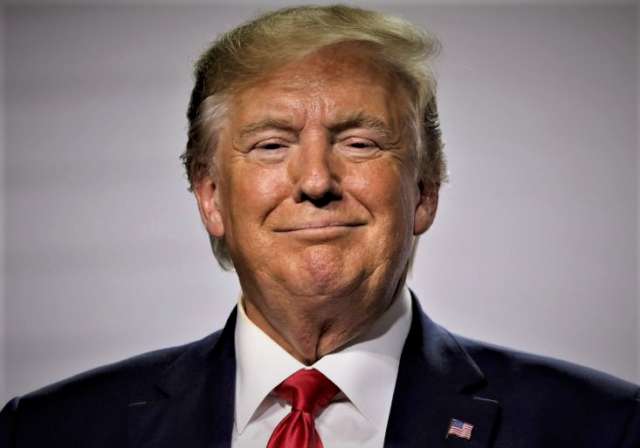
US Supreme Court Rules States Can't Bar Trump from Ballot Based on Insurrection Clause

Published on March 4 2024 4:22 pm
Last Updated on March 4 2024 4:23 pm
By PETER HANCOCK
Capitol News Illinois
phancock@capitolnewsillinois.com
SPRINGFIELD – The U.S. Supreme Court ruled Monday that individual states do not have authority to disqualify candidates for federal office based on the insurrection clause of the 14th Amendment.
The unanimous ruling by the nation’s high court overturned a decision by the Colorado Supreme Court. But it also had implications in Illinois and other states where Trump had been accused of taking part in an insurrection during the events surrounding the assault on the U.S. Capitol on Jan. 6, 2021.
“We conclude that States may disqualify persons holding or attempting to hold state office,” the court said in an unsigned opinion. “But States have no power under the Constitution to enforce Section 3 (of the 14th Amendment) with respect to federal offices, especially the Presidency.”
That clause bars anyone from holding federal or state office if they previously took an oath to defend the Constitution and then later participated in an insurrection or rebellion against the United States or gave aid and comfort to its enemies.
Enacted in the aftermath of the Civil War, it was intended to prevent former Confederates who had served in government before the war from returning to positions of power, but it has rarely been used in the nearly 150 years since the end of Reconstruction.
There was renewed interest in the amendment in the wake of events on Jan. 6, 2021, when throngs of protesters – many of them arguably summoned to action by Trump and his allies – stormed the Capitol in an effort to prevent Congress from certifying the results of the 2020 elections in which Trump was defeated for reelection by Democrat Joe Biden.
When Trump filed to run again in 2024, challenges were filed in several states. In Illinois, a group of voters filed an objection to his candidacy in the March 19 Republican primary, arguing that he was disqualified under the 14th Amendment.
The Illinois State Board of Elections dismissed the objection, partially on the grounds that it did not have authority to decide constitutional questions. But last week, a Cook County circuit judge reversed that decision and ordered Trump removed from the Illinois primary ballot, although she put her decision on hold pending further appeals in state courts as well as the pending U.S. Supreme Court decision.
When the nation’s high court issued its decision Monday, Ron Fein, legal director of the voting rights group Free Speech for People, which organized the ballot challenge in Illinois, called the ruling “disgraceful.”
“The Supreme Court couldn’t exonerate Trump because the evidence of his guilt was overwhelming, so instead the Justices neutered our Constitution’s built-in defense against insurrectionists and said the facts don’t matter,” he said in a statement.
But Trump, in remarks at his Mar-a-Lago estate that were carried on CBS News, called the decision “important” and “well crafted.”
“And I think it will go a long way toward bringing our country together which our country needs,” he said.
The unanimous portion of the ruling did not address several questions such as whether Trump’s actions on Jan. 6 constituted an insurrection or whether Section 3 of the 14th Amendment applies to the office of president. It only held that individual states are not empowered to enforce that provision because allowing them to do so could lead to conflicting opinions and wreak havoc on national elections.
“The ‘patchwork’ that would likely result from state enforcement would ‘sever the direct link that the Framers found so critical between the National Government and the people of the United States’ as a whole,” the court said, quoting from an earlier Supreme Court decision.
Although the court was unanimous in saying states do not have authority to enforce Section 3 of the 14th Amendment, it was more divided on the question of how that provision could be enforced.
A majority on the court cited Section 5 of the amendment and said only Congress could enforce that provision through “appropriate legislation.” But three justices who were nominated to their seats by Democratic presidents – Sonia Sotomayor, Elena Kagan, and Ketanji Brown Jackson – wrote a concurring opinion saying it was unnecessary to address Congress’ powers or duties.
“Today, the majority goes beyond the necessities of this case to limit how Section 3 can bar an oathbreaking insurrectionist from becoming President,” they wrote. “Although we agree that Colorado cannot enforce Section 3, we protest the majority’s effort to use this case to define the limits of federal enforcement of that provision.”
A fourth justice, Amy Coney Barrett, wrote separately that the opinion should have been limited to reversing the Colorado Supreme Court decision.
Answering questions at an unrelated event in Urbana Monday, Democratic Gov. JB Pritzker said he believed Trump remaining on the ballot would be a net positive for Democrats in Illinois.
“We’re going to win here in Illinois and beat Donald Trump and, I think I said yesterday or the day before, I think it will help Democrats that he’s on the ballot,” Pritzker said.
David Becker, executive director of the nonpartisan Center for Election Innovation & Research, said the decision effectively put an end to state-level challenges to Trump’s candidacy based on the 14th Amendment. But he said the issue will almost certainly come up again if Trump wins the general election in November.
“The one place where I think this is likely to come up is on Jan. 6, (2025),” he said. “If Donald Trump wins, I think we can absolutely expect that there will be members of Congress who will object to his electoral votes – perhaps in many, many states – on the basis that he's not a qualified candidate, because he violated section three of the 14th amendment.”
Capitol News Illinois is a nonprofit, nonpartisan news service covering state government. It is distributed to hundreds of newspapers, radio and TV stations statewide. It is funded primarily by the Illinois Press Foundation and the Robert R. McCormick Foundation, along with major contributions from the Illinois Broadcasters Foundation and Southern Illinois Editorial Association.












